- Home
- Neal Shusterman
UnWholly Page 4
UnWholly Read online
Page 4
Page 4
Starkey groans, and some woman beyond his limited peripheral vision laughs. “Don’t be so surprised. Unwinds all got this look in their eye that lowlifes and runaways don’t. We knew the truth without you saying a thing. ”
Starkey tries to move, but he can barely lift his limbs.
“Don’t,” says a girl he can’t see from somewhere behind him. “Don’t move or I’ll zap you even worse than the wallet did. ”
Starkey knows he’s fallen for a parts pirate’s trap. He thought he was smarter, and he silently curses his luck . . . until the man who pretended to be drunk says, “You’ll like this safe house. Good food, even if it does smell a little. ”
“Wh-what?”
Laughs from everyone around him. There may be four or five people in the van. But his vision still isn’t clear enough to get an accurate count.
“I love that look on their faces,” the woman says. Now she comes into his field of vision and grins at him. “You know how they tranq escaped lions so they can bring them back to safety before they get themselves in a heap of trouble?” she says. “Well, today you’re the lion. ”
PUBLIC SERVICE ANNOUNCEMENT
“Hi, kids! Watchdog Walter here, eyes open and nose to the ground! Not everyone can be a bloodhound like me, but now you can join my Junior Watchdog Club! You’ll receive your own Junior Watchdog kit, and a monthly newsletter with games and tips on spotting crime in your own neighborhood, from suspicious strangers to Unwind ‘danger-houses!’ With you on the job, bad guys and AWOLs don’t stand a chance! So join today! And remember, Junior Watchdogs—eyes open and nose to the ground!”
Sponsored by Neighborhood Watch Inc.
The safe house is a sewer pump station. Automated. No city workers ever show up unless something breaks.
“You get used to the smell,” Starkey is told as they bring him in, which he finds hard to believe—but it turns out to be true. Apparently one’s sense of smell realizes it’s going to lose the battle and just goes with it—and, as they told him in the van, the food makes up for it.
The whole place is a petri dish of angst, generated by kids whose parents gave up on them, which is the worst kind of angst there is. There are fights and ridiculous posturing on a daily basis.
Starkey’s always been a natural leader among sketchy outcasts and borderline personalities, and the safe house is no exception. He quickly rises in the social ranks. Word of his escape act is already churning out smoke in the rumor mill, helping his status from the very beginning.
“Is it true you shot two Juvey-cops?”
“Yep. ”
“Is it true you shot your way out of lockup with a machine gun?”
“Sure, why not?”
And the best part is that the storked kids—who, even among Unwinds, are treated like second-class citizens—are now the elite, thanks to him!
Starkey says the storks get served first? They get served first. Starkey says they get the best beds, farthest from the stinking vents? They get the best beds. His word is law. Even those running the place know that Starkey is their greatest asset, and they know to keep him happy, because if he becomes an enemy, then every Unwind there is an enemy too.
He starts to settle in, figuring he’ll be there until he’s seventeen—but then in the middle of the night they’re rounded up and taken away by the ADR—shuffled like a deck of cards to different safe houses.
“This is the way it works,” they’re all told. The reason, Starkey comes to understand, is twofold. One, it keep the kids moving closer to their destination, wherever that might be. Two, it splits them apart to keep any alliances from becoming permanent. Kind of like unwinding the mob rather than the individuals to keep them in line.
Their plan, however, backfires with Starkey, because in each safe house he manages to earn respect, building his credibility among more and more kids. In each new location he comes across Unwinds who fancy themselves alpha males, trying to take charge, but in truth they’re just betas waiting for an alpha to humble them into submission.
In every instance, Starkey finds his opportunity to challenge, defeat, and rise above. Then there’s another midnight ride, another shake-up, and a new safe house. Each time Starkey learns a new social skill, something to serve him, something to make him even more effective at gathering and galvanizing these scared, angry kids. There could be no better leadership program than the safe houses of the Anti-Divisional Resistance.
And then come the coffins.
They show up at the final safe house: a shipment of lacquered wood caskets with rich satin linings. Most kids are terrified; Starkey is just amused.
“Get in!” they’re told by armed resistance fighters who look more like special ops. “No questions, just get in. Two to a box! Move it!”
Some kids hesitate, but the smarter ones quickly find a partner like it’s a sudden square dance, and nobody wants to be stuck with someone too tall, too fat, too unwashed, or too randy—because none of those things would fare well in the confines of a coffin—but no one actually gets in until Starkey gives the nod.
“If they meant to bury us,” he tells them, “they would have done it already. ” As it turns out, he’s more persuasive than the guys with the guns.
He chooses to share his little box with a wisp of a girl who is giddy at having been chosen by him. Not that he particularly likes her, but she is so slight that she’ll barely take up any room. Once they’re wedged in together in a tight spoon position, they’re handed an oxygen tank and then closed into the darkness of the coffin together.
“I’ve always liked you, Mason,” says the girl, whose name he can’t recall. He’s surprised that she knows his first name, since he never uses it anymore. “Of all the boys in the safe houses, you’re the only one who makes me feel safe. ”
He doesn’t respond; he just kisses her on the back of her head, to maintain his image as the safest port in her storm. It’s a powerful feeling to know you make others feel safe.
“We . . . could, you know . . . ,” she says coyly.
He reminds her that the ADR workers were very clear. “No extracurricular activities,” they had said, “or you’ll use up your oxygen and die. ” Starkey doesn’t know if it’s true, but it certainly is a good argument for restraint. Besides, even if someone were stupid enough to tempt fate, there’s not enough space to move, much less generate any sort of friction, so the point is moot. He wonders if it’s some sort of twisted joke the adults are having, shoving hormonal teens into tight quarters but making it impossible to do anything but breathe.
“I wouldn’t mind suffocating if it was with you,” the girl says, which is flattering, but makes him even less interested in her.
“There’ll be a better time,” he tells her, knowing that such a time will never come—at least not for her—but hope is a powerful motivator.
Eventually they settle into a sort of symbiotic breathing rhythm. He breathes in when she breathes out, so their chests don’t fight for space.
After a while, there’s a jarring motion. With his arm now around the girl, he holds her a little more tightly, knowing that easing her fear somehow eases his own. Soon there’s a strange kind of acceleration, like they’re in a speeding car, but the angle changes, tilting them.
“A plane?” asks the girl.
“I think so. ”
“What now?”
He doesn’t answer because he doesn’t know. Starkey begins to feel light-headed and, remembering the oxygen tank, turns the valve so that it slowly hisses. The coffin isn’t quite air tight, but closed tightly enough that they would suffocate without that oxygen, even in the pressurized hull of a plane. In a few minutes the stress-induced exhaustion puts the girl to sleep, but not Starkey. Finally, an hour later, the sudden jar of landing jolts the girl awake.
“Where do you think we are?” the girl asks.
Starkey is feeling irritable from the tight quarters but tries not to show i
t. “We’ll find out soon enough. ”
Twenty minutes of anticipation, and finally the lid is unlatched and opened, resurrecting the two of them from the dead.
There’s a smiling kid with braces above them.
“Hello, I’m Hayden, and I’ll be your personal savior today,” he says brightly. “Oh look! No vomit or other unpleasant bodily fluids. Lucky you!”
With barely any blood circulating in his feet, Starkey joins a limping procession out of the jet’s cargo hold and into the blinding day. What he sees before him as his eyes adjust seems more like a mirage than anything real.
It’s a desert filled with thousands of airplanes.
Starkey’s heard of places like this, airplane boneyards where decommissioned aircraft go to die. Around them are teens in military camouflage, carrying weapons. They’re not unlike the adults back at the last safe house, just younger. They herd the kids into a loose formation at the bottom of the ramp.
A Jeep drives up. Clearly this is the approach of someone important, someone who will tell them why they’re here.
The Jeep comes to a halt, and out steps an unremarkable-looking teenager in blue camouflage. He’s Starkey’s age or maybe a little bit older, and he has scars on the right half of his face.
As the crowd gets a good look at him, people begin to murmur with excitement. The kid raises his hand to quiet them down, and Starkey spots a shark tattoo on his arm.
“No way!” a fat kid next to Starkey says. “You know who that is? That’s the Akron AWOL! That’s Connor Lassiter. ”
Starkey scoffs, “Don’t be ridiculous, the Akron AWOL is dead. ”
“No, he ain’t! He’s right there!”
The very idea sends a surge of adrenaline through Starkey’s body, finally bringing circulation back to his limbs. But no—as he looks at this teen trying to rein in the chaos, he realizes this couldn’t be Connor Lassiter. This kid does not look the part at all. His hair is tousled, not coolly slicked back, the way Starkey always imagined it would be. This kid looks too open and honest—not quite innocent, but he has nowhere near the level of jaded anger that the Akron AWOL would have. The only thing about him that could even slightly resemble Starkey’s image of Connor Lassiter would be the slight smirk that always seems to be on his face. No, this kid before them, trying to command their respect, is nobody special. Nobody at all.
“Let me be the first to welcome you to the Graveyard,” he says, delivering what must be the same speech he delivers to every batch of new arrivals. “Officially my name is Elvis Robert Mullard . . . but my friends call me Connor. ”
Cheers from the Unwinds.
“Told you so!” says the fat kid.
“Doesn’t prove anything,” says Starkey, his jaw set and teeth clenched as the speech continues.
“You’re all here because you were marked for unwinding but escaped, and thanks to the efforts of a whole lot of people with the Anti-Divisional Resistance, you’ve made it here. This will be your home until you turn seventeen and can’t be unwound. That’s the good news. . . . ”
Starkey groans, and some woman beyond his limited peripheral vision laughs. “Don’t be so surprised. Unwinds all got this look in their eye that lowlifes and runaways don’t. We knew the truth without you saying a thing. ”
Starkey tries to move, but he can barely lift his limbs.
“Don’t,” says a girl he can’t see from somewhere behind him. “Don’t move or I’ll zap you even worse than the wallet did. ”
Starkey knows he’s fallen for a parts pirate’s trap. He thought he was smarter, and he silently curses his luck . . . until the man who pretended to be drunk says, “You’ll like this safe house. Good food, even if it does smell a little. ”
“Wh-what?”
Laughs from everyone around him. There may be four or five people in the van. But his vision still isn’t clear enough to get an accurate count.
“I love that look on their faces,” the woman says. Now she comes into his field of vision and grins at him. “You know how they tranq escaped lions so they can bring them back to safety before they get themselves in a heap of trouble?” she says. “Well, today you’re the lion. ”
PUBLIC SERVICE ANNOUNCEMENT
“Hi, kids! Watchdog Walter here, eyes open and nose to the ground! Not everyone can be a bloodhound like me, but now you can join my Junior Watchdog Club! You’ll receive your own Junior Watchdog kit, and a monthly newsletter with games and tips on spotting crime in your own neighborhood, from suspicious strangers to Unwind ‘danger-houses!’ With you on the job, bad guys and AWOLs don’t stand a chance! So join today! And remember, Junior Watchdogs—eyes open and nose to the ground!”
Sponsored by Neighborhood Watch Inc.
The safe house is a sewer pump station. Automated. No city workers ever show up unless something breaks.
“You get used to the smell,” Starkey is told as they bring him in, which he finds hard to believe—but it turns out to be true. Apparently one’s sense of smell realizes it’s going to lose the battle and just goes with it—and, as they told him in the van, the food makes up for it.
The whole place is a petri dish of angst, generated by kids whose parents gave up on them, which is the worst kind of angst there is. There are fights and ridiculous posturing on a daily basis.
Starkey’s always been a natural leader among sketchy outcasts and borderline personalities, and the safe house is no exception. He quickly rises in the social ranks. Word of his escape act is already churning out smoke in the rumor mill, helping his status from the very beginning.
“Is it true you shot two Juvey-cops?”
“Yep. ”
“Is it true you shot your way out of lockup with a machine gun?”
“Sure, why not?”
And the best part is that the storked kids—who, even among Unwinds, are treated like second-class citizens—are now the elite, thanks to him!
Starkey says the storks get served first? They get served first. Starkey says they get the best beds, farthest from the stinking vents? They get the best beds. His word is law. Even those running the place know that Starkey is their greatest asset, and they know to keep him happy, because if he becomes an enemy, then every Unwind there is an enemy too.
He starts to settle in, figuring he’ll be there until he’s seventeen—but then in the middle of the night they’re rounded up and taken away by the ADR—shuffled like a deck of cards to different safe houses.
“This is the way it works,” they’re all told. The reason, Starkey comes to understand, is twofold. One, it keep the kids moving closer to their destination, wherever that might be. Two, it splits them apart to keep any alliances from becoming permanent. Kind of like unwinding the mob rather than the individuals to keep them in line.
Their plan, however, backfires with Starkey, because in each safe house he manages to earn respect, building his credibility among more and more kids. In each new location he comes across Unwinds who fancy themselves alpha males, trying to take charge, but in truth they’re just betas waiting for an alpha to humble them into submission.
In every instance, Starkey finds his opportunity to challenge, defeat, and rise above. Then there’s another midnight ride, another shake-up, and a new safe house. Each time Starkey learns a new social skill, something to serve him, something to make him even more effective at gathering and galvanizing these scared, angry kids. There could be no better leadership program than the safe houses of the Anti-Divisional Resistance.
And then come the coffins.
They show up at the final safe house: a shipment of lacquered wood caskets with rich satin linings. Most kids are terrified; Starkey is just amused.
“Get in!” they’re told by armed resistance fighters who look more like special ops. “No questions, just get in. Two to a box! Move it!”
Some kids hesitate, but the smarter ones quickly find a partner like it’s a sudden square dance, and nobody wants to be stuck with someone too tall, too fat, too unwashed, or too randy—because none of those things would fare well in the confines of a coffin—but no one actually gets in until Starkey gives the nod.
“If they meant to bury us,” he tells them, “they would have done it already. ” As it turns out, he’s more persuasive than the guys with the guns.
He chooses to share his little box with a wisp of a girl who is giddy at having been chosen by him. Not that he particularly likes her, but she is so slight that she’ll barely take up any room. Once they’re wedged in together in a tight spoon position, they’re handed an oxygen tank and then closed into the darkness of the coffin together.
“I’ve always liked you, Mason,” says the girl, whose name he can’t recall. He’s surprised that she knows his first name, since he never uses it anymore. “Of all the boys in the safe houses, you’re the only one who makes me feel safe. ”
He doesn’t respond; he just kisses her on the back of her head, to maintain his image as the safest port in her storm. It’s a powerful feeling to know you make others feel safe.
“We . . . could, you know . . . ,” she says coyly.
He reminds her that the ADR workers were very clear. “No extracurricular activities,” they had said, “or you’ll use up your oxygen and die. ” Starkey doesn’t know if it’s true, but it certainly is a good argument for restraint. Besides, even if someone were stupid enough to tempt fate, there’s not enough space to move, much less generate any sort of friction, so the point is moot. He wonders if it’s some sort of twisted joke the adults are having, shoving hormonal teens into tight quarters but making it impossible to do anything but breathe.
“I wouldn’t mind suffocating if it was with you,” the girl says, which is flattering, but makes him even less interested in her.
“There’ll be a better time,” he tells her, knowing that such a time will never come—at least not for her—but hope is a powerful motivator.
Eventually they settle into a sort of symbiotic breathing rhythm. He breathes in when she breathes out, so their chests don’t fight for space.
After a while, there’s a jarring motion. With his arm now around the girl, he holds her a little more tightly, knowing that easing her fear somehow eases his own. Soon there’s a strange kind of acceleration, like they’re in a speeding car, but the angle changes, tilting them.
“A plane?” asks the girl.
“I think so. ”
“What now?”
He doesn’t answer because he doesn’t know. Starkey begins to feel light-headed and, remembering the oxygen tank, turns the valve so that it slowly hisses. The coffin isn’t quite air tight, but closed tightly enough that they would suffocate without that oxygen, even in the pressurized hull of a plane. In a few minutes the stress-induced exhaustion puts the girl to sleep, but not Starkey. Finally, an hour later, the sudden jar of landing jolts the girl awake.
“Where do you think we are?” the girl asks.
Starkey is feeling irritable from the tight quarters but tries not to show i
t. “We’ll find out soon enough. ”
Twenty minutes of anticipation, and finally the lid is unlatched and opened, resurrecting the two of them from the dead.
There’s a smiling kid with braces above them.
“Hello, I’m Hayden, and I’ll be your personal savior today,” he says brightly. “Oh look! No vomit or other unpleasant bodily fluids. Lucky you!”
With barely any blood circulating in his feet, Starkey joins a limping procession out of the jet’s cargo hold and into the blinding day. What he sees before him as his eyes adjust seems more like a mirage than anything real.
It’s a desert filled with thousands of airplanes.
Starkey’s heard of places like this, airplane boneyards where decommissioned aircraft go to die. Around them are teens in military camouflage, carrying weapons. They’re not unlike the adults back at the last safe house, just younger. They herd the kids into a loose formation at the bottom of the ramp.
A Jeep drives up. Clearly this is the approach of someone important, someone who will tell them why they’re here.
The Jeep comes to a halt, and out steps an unremarkable-looking teenager in blue camouflage. He’s Starkey’s age or maybe a little bit older, and he has scars on the right half of his face.
As the crowd gets a good look at him, people begin to murmur with excitement. The kid raises his hand to quiet them down, and Starkey spots a shark tattoo on his arm.
“No way!” a fat kid next to Starkey says. “You know who that is? That’s the Akron AWOL! That’s Connor Lassiter. ”
Starkey scoffs, “Don’t be ridiculous, the Akron AWOL is dead. ”
“No, he ain’t! He’s right there!”
The very idea sends a surge of adrenaline through Starkey’s body, finally bringing circulation back to his limbs. But no—as he looks at this teen trying to rein in the chaos, he realizes this couldn’t be Connor Lassiter. This kid does not look the part at all. His hair is tousled, not coolly slicked back, the way Starkey always imagined it would be. This kid looks too open and honest—not quite innocent, but he has nowhere near the level of jaded anger that the Akron AWOL would have. The only thing about him that could even slightly resemble Starkey’s image of Connor Lassiter would be the slight smirk that always seems to be on his face. No, this kid before them, trying to command their respect, is nobody special. Nobody at all.
“Let me be the first to welcome you to the Graveyard,” he says, delivering what must be the same speech he delivers to every batch of new arrivals. “Officially my name is Elvis Robert Mullard . . . but my friends call me Connor. ”
Cheers from the Unwinds.
“Told you so!” says the fat kid.
“Doesn’t prove anything,” says Starkey, his jaw set and teeth clenched as the speech continues.
“You’re all here because you were marked for unwinding but escaped, and thanks to the efforts of a whole lot of people with the Anti-Divisional Resistance, you’ve made it here. This will be your home until you turn seventeen and can’t be unwound. That’s the good news. . . . ”

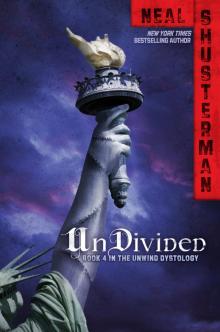 UnDivided
UnDivided UnBound
UnBound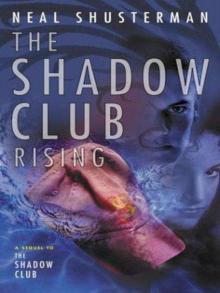 The Shadow Club Rising
The Shadow Club Rising Scorpion Shards
Scorpion Shards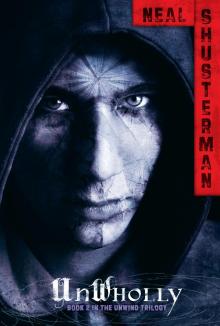 UnWholly
UnWholly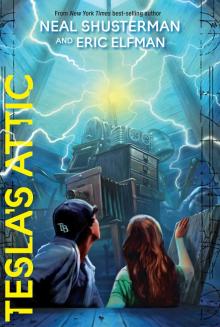 Tesla's Attic
Tesla's Attic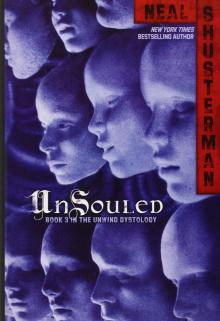 UnSouled
UnSouled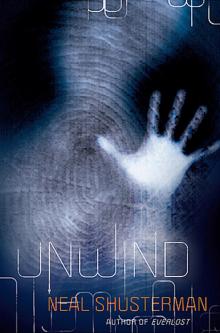 Unwind
Unwind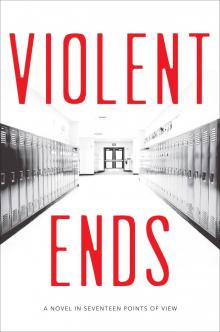 Violent Ends
Violent Ends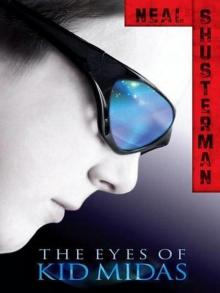 The Eyes of Kid Midas
The Eyes of Kid Midas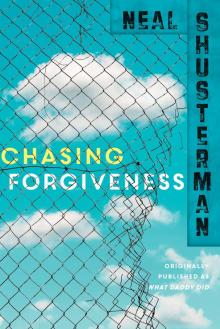 Chasing Forgiveness
Chasing Forgiveness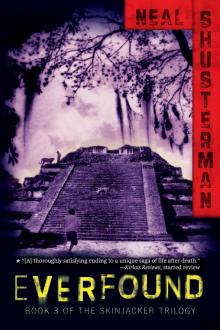 Everfound
Everfound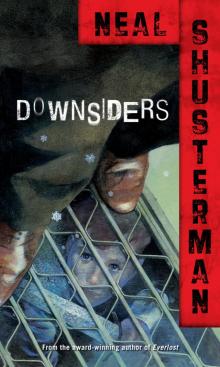 Downsiders
Downsiders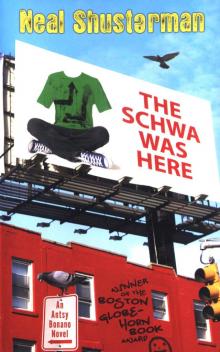 The Schwa Was Here
The Schwa Was Here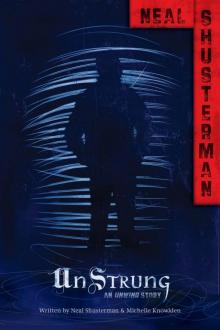 UnStrung
UnStrung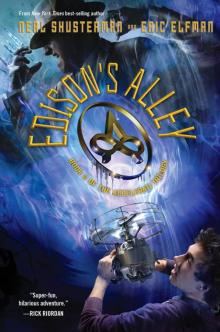 Edison's Alley
Edison's Alley Duckling Ugly
Duckling Ugly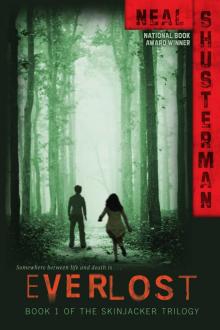 Everlost
Everlost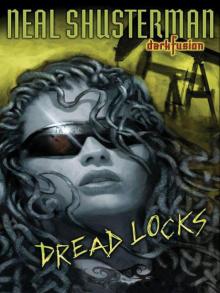 Dread Locks
Dread Locks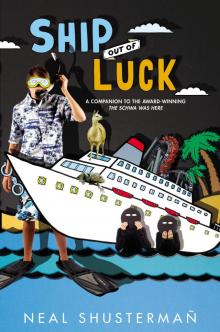 Antsy Floats
Antsy Floats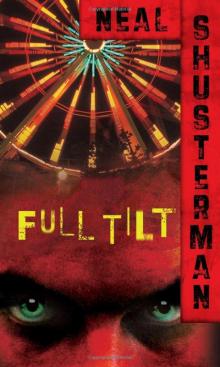 Full Tilt
Full Tilt Thunderhead
Thunderhead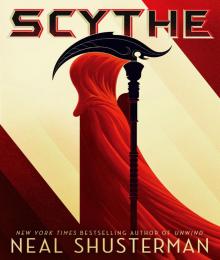 Scythe
Scythe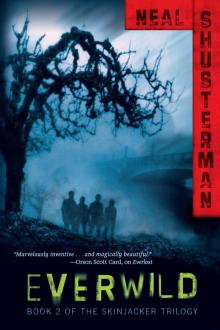 Everwild
Everwild Challenger Deep
Challenger Deep Shattered Sky
Shattered Sky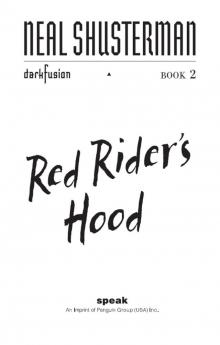 Red Rider's Hood
Red Rider's Hood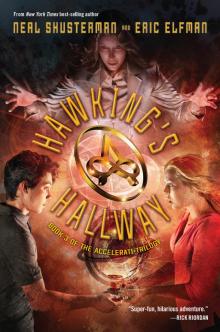 Hawking's Hallway
Hawking's Hallway Antsy Does Time
Antsy Does Time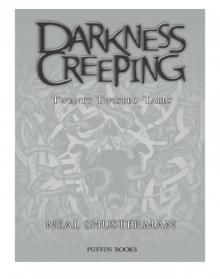 Darkness Creeping: Twenty Twisted Tales
Darkness Creeping: Twenty Twisted Tales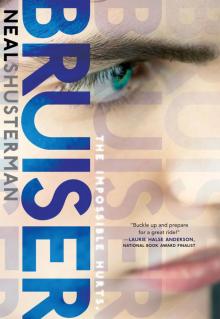 Bruiser
Bruiser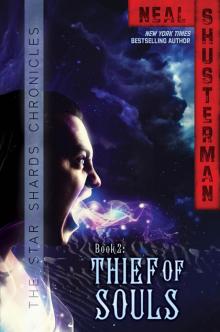 Thief of Souls
Thief of Souls The Toll
The Toll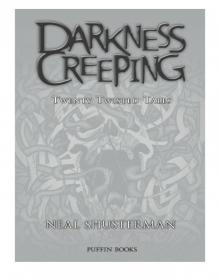 Darkness Creeping
Darkness Creeping Resurrection Bay
Resurrection Bay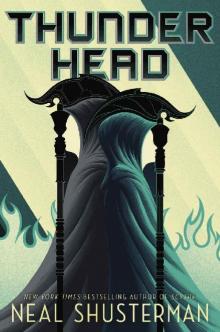 Thunderhead (Arc of a Scythe Book 2)
Thunderhead (Arc of a Scythe Book 2)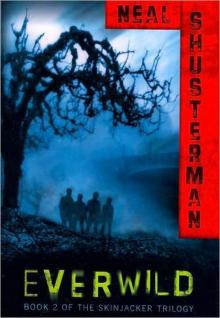 Everwild (The Skinjacker Trilogy)
Everwild (The Skinjacker Trilogy)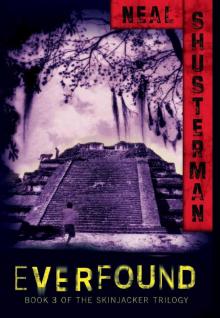 Everfound s-3
Everfound s-3 Edison’s Alley
Edison’s Alley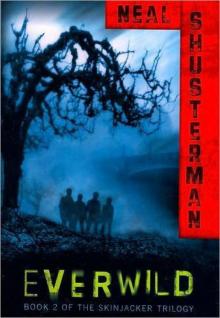 Everwild s-2
Everwild s-2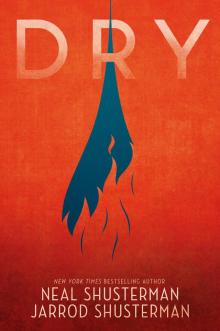 Dry
Dry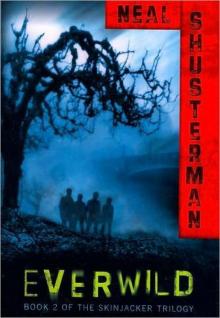 Skinjacker 02 Everwild
Skinjacker 02 Everwild Everlost s-1
Everlost s-1